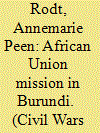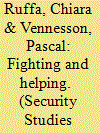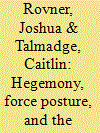| Srl | Item |
| 1 |
ID:
114740


|
|
|
|
|
| Publication |
2012.
|
| Summary/Abstract |
In 2002, the African Union (AU) was established to promote peace, security and stability on the continent. Since then, it has launched military operations to help regulate conflicts in Burundi, Comoros, Sudan and Somalia. This contribution evaluates the African Mission in Burundi (AMIB). It explores the AU's nascent approach to peacekeeping and investigates the relationship between its aspiration, experience and prospect of providing 'African solutions to African problems' in the security realm. The AMIB case study suggests that both the intervener's capabilities and the conflict context in which it operates affect its success. How these two categories relate to each other also matters. Different actors affect both internal and external contextual conditions. More support from one actor can compensate for less support from another. During AMIB, South African commitments made up for limited resources on part of the AU, its member states and institutions as well as insufficient interest from international donors.
|
|
|
|
|
|
|
|
|
|
|
|
|
|
|
|
| 2 |
ID:
134008


|
|
|
|
|
| Publication |
2014.
|
| Summary/Abstract |
In complex humanitarian emergencies, why are NGO-military relations cooperative in some cases, yet deeply conflictual in others? Drawing on historical-institutionalist theoretical insights, we argue that NGOs and military organizations are embedded in, and responding to, domestic institutional configurations that define a set of political incentives and constraints, material and normative, which structures and influences the characteristics and outcomes of their relations. Counterarguments suggest that organizational differences and the nature of their missions affect NGO-military relations. Using fresh empirical evidence we assess these arguments by comparing the Italian and the French experiences of NGO-military relations during the NATO-led International Security Assistance Force (ISAF) mission in Afghanistan and the UN mission in Lebanon (UNIFIL II) between 2007 and 2011.We find that domestic institutional configurations are not left behind when NGOs and military units deploy abroad. Rather, they shape NGOs' and militaries' capacity to work together instead of at cross purposes and ultimately influence the success of international action.
|
|
|
|
|
|
|
|
|
|
|
|
|
|
|
|
| 3 |
ID:
134007


|
|
|
|
|
| Publication |
2014.
|
| Summary/Abstract |
International relations theories emphasize the stabilizing role hegemons play in world politics. But little scholarship has examined the link connecting hegemony to its potentially positive returns in the security realm: force posture. We correct this deficit by developing and testing an argument about the consequences of different hegemonic force postures under varying threat conditions. We present a typology of force posture options and probe their effects through over-time analysis of how major powers have worked to provide one particularly important public good since 1945: access to Persian Gulf oil. Drawing on field work, we also explore the implications of our framework for current and future US force posture in the region. We conclude that hegemonic stability is a very real phenomenon in the Gulf, but it does not require the massive forward deployment of US forces that has characterized the past twenty years of US presence there.
|
|
|
|
|
|
|
|
|
|
|
|
|
|
|
|